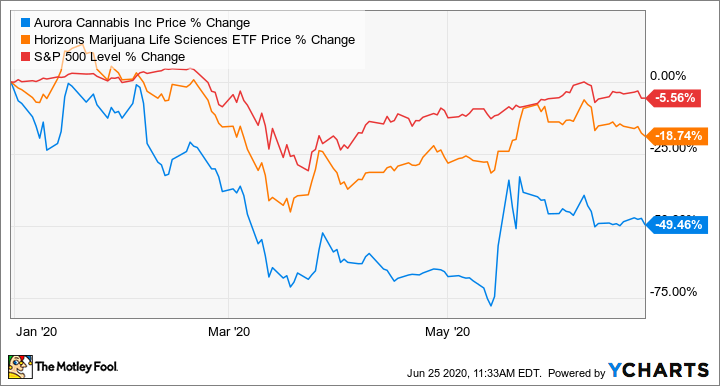Cannabis stocks are in for their first big test -- a recession. In the early stages of the COVID-19 pandemic, things were looking good for the cannabis industry as people were stockpiling essentials, including pot.
But let's take a look at how the industry's done since then and whether investing in pot stocks can be a safe way to protect your portfolio during a recession.
What the numbers tell us
To start, let's look at the Canadian cannabis market, the only legal one in North America. In March, adult-use cannabis sales in Canada totaled 181.1 million Canadian dollars. That was a sizable 19% jump from CA$151.9 million in February. In April, however, there was a slight decline, with sales falling to CA$180.1 million. It's not unheard of for pot sales to decline somewhat from month to month, and at first glance, the numbers do look pretty steady where they are.

Image source: Getty Images.
In the U.S. markets, the numbers have continued to show strength even as millions of Americans are losing their jobs. In Illinois, May was a record month for the new recreational pot market. Sales of $44.3 million were a new high for the industry. Previously, the sales record was $39 million in January. That was also the first month the recreational market opened for business in Illinois. The state's also on track to hit a record for medical marijuana sales this year.
Oregon was another state that had a stellar month in May as its cannabidiol (CBD) sales hit the $100 million mark for the first time ever. The state has permitted cannabis sales since 2015, and May was the third month in a row in which it posted record results for CBD. In Oklahoma, medical marijuana sales also reached all-time highs of over $73 million in May.
During the early stages of the recession, in several markets, there still seems to be strong demand for cannabis. Whether it's medical, recreational, in Canada, or in the U.S., there's a good cross-section of data suggesting that, at least for now, the cannabis industry's looking stable amid this recession.
Why sales growth alone isn't enough to make pot stocks safe
Although sales are rising in many markets, that doesn't mean cannabis stocks are recession-proof. Even if sales are likely to remain stable amid the economic downturn, pot stocks themselves are still extremely volatile.
When Aurora Cannabis (ACB -6.81%) released its third-quarter results on May 14, the stock got a big boost in share price as investors were encouraged by the pot producer's improved quarter. Aurora had a smaller loss than in the previous quarter, and its sales were also up.
But year to date, the stock's still down around 50%, and it's continued to fall during the past month. Here's how it's done against both the Horizon Marijuana Life Sciences ETF (HMLSF 3.22%) and the S&P 500:
The reason for the volatility is simple: Pot stocks aren't stable or consistent. When you think of recession-proof stocks, you probably think of utility stocks or businesses that have recurring sources of revenue that will be there even if there's a recession. But Aurora's been anything but stable.
The Alberta-based cannabis producer has recorded an operating loss in each of its last 10 quarters, and its sales have fluctuated between $CA56 million and CA$99 million during just the past four reporting periods.
Without stability, pot stocks attract many speculators and short-term investors who can create volatility. But as cannabis companies mature and develop more sustainable businesses over the long term, investing in marijuana will become a lot safer, perhaps even recession-proof.
Key takeaway for investors
At a high level, you can argue that the industry is showing resiliency amid the pandemic and that it has the potential to be recession-proof. But that doesn't mean the underlying stocks are, at least not yet.
Given the financial challenges many cannabis companies are facing today, they're nowhere near recession-proof. And they could even be dangerous investments to hold during a downturn, especially as investors turn to safer, more stable stocks during a recession.
It could take years before pot stocks solidify their financials and become more stable investments to hold on to.






